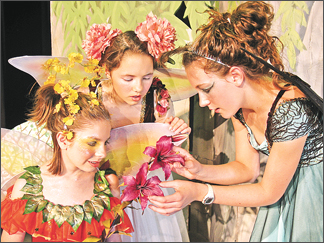Shakespeare in retrospect - Part I
Elmo Fernando
|
King Lear
* A tragedy
* Based on the legend of
Leir of Britain, a mythological pre-Roman Celtic king
* Has been widely adapted
for stage and screen
* Particularly noted for its
probing observations on the nature of human suffering and
kinship. |
|
Henry IV
* A history play
* Second play in
Shakespeare’s tetralogy dealing with the successive reigns
of Richard II, Henry IV (2 plays), and Henry V |
William Shakespeare’s advent to the theatre was rooted in the needs
and peculiar opportunities that such a remarkable venture afforded his
inborn talent. As playwright he felt under no more constant obligation
to settle his characters on a precise motive than had he been telling
his amazing tale in no other fashion.
His drama was rooted in his own age and in the conditions of his art
on the stage and its concepts of the audience as well as in the theatre
of earlier generations of England.
What he thought of others, what was imposed upon him by the
conditions of his theatrical concepts of earlier generations in England.
What he learnt of others what was imposed upon him by the conditions
of his times, as well as what he gave of his own has come down the ages
blended together in his plays. And with his genius and prestige he has
dwarfed his contemporaries obscured his background and polarised all
thought about drama.
It is therefore of the utmost importance to seek to know under what
influences Shakespeare worked subdued to his medium yet not enslaved by
it. Take for instance this sonnet -
“My mistress’ eyes are nothing like the sun
Coral is for more red than her lips red,
If snow be white, why then her breasts are dun;
If hairs be wires black wires grow on her head;
|
King John
* A history play
* Dramatises the reign of
King John of England (ruled 1199–1216), son of Henry II of
England and Eleanor of Aquitaine and father of Henry III of
England |
|
A
Midsummer Night’s Dream
* A comedy
* A Portrays the adventures
of four young Athenian lovers and a group of amateur actors,
their interactions with the Duke of Athens, Theseus, the
Queen of the Amazons, Hippolyta, and with the fairies who
inhabit a moonlit forest
* One of Shakespeare’s most
popular works for the stage and is widely performed
|
I have seen roses damaskt red and white,
But no such roses see I in her cheeks.”
Perhaps he gradually abandoned allusions of myth and the sentimental
Elizabethan imagery. In A Midsummer Night’s Dream he positively chaffs
the Elizabethan lover in a speech of Demetrius. Faulcombridge in King
John and Hotspur in Henry IV follow suit. Mercutio strikes the same note
while the lovesick Romeo and Benedick laughs at mythology and himself.
Mercutio strikes the same note while the lovesick Romeo and Benedick
laughs at mythology and himself.
The new attitude finds clear expression on the lips of Rosalind:
Troilus had his brains dashed out with a Grecian club; yet he did
what he could to die before and he is one of the patterns of love.
Leander, he would have lived many a fair year, though, Hero had turned
nun if it had not been for a hot summer night; for good youth he went
forth to work himself in the Hellespont and being taken with the cramp
was drowned; and the foolish coroners of that age found it was Hero of
Sertos. But these are all lies; men have died from time to time and
worms have devoured them often.
 |
|
A scene
from A Midsummer Night’s Dream |
Epilogue of music
It is not conceivable in the light of this that Shakespeare intends
the opening of that epilogue of music and moonlight, which mitigates the
bitter taste of Shylock’s downfall, to be, beautiful though it is and
his most careful variation on the old mythological theme, a deliberate
presentation of sentimental love; just as lovesickness is treated with
affectionate irony in Twelfth Night.
In the tragedies the mythology has its natural place when the setting
is Roman and it effectively shown amazingly in King Lear to which
Shakespeare intentionally gave a pagan and primitive atmosphere.
To be continued next week
|



